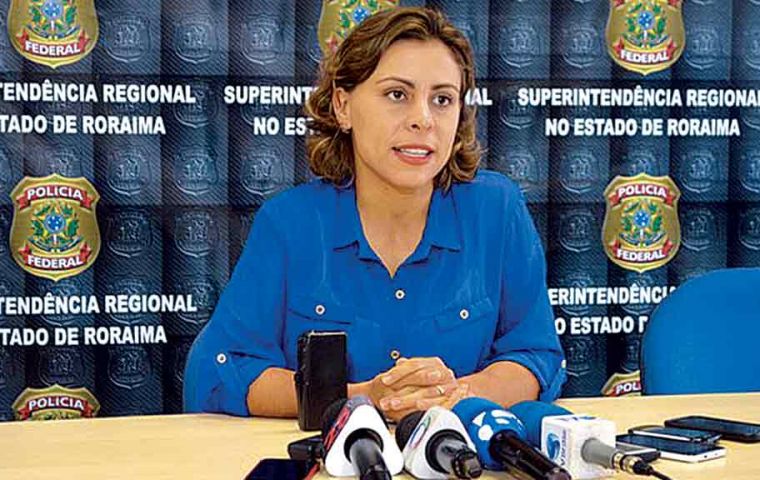MercoPress. South Atlantic News Agency
Brazil: Police report says Bolsonaro's guilt proven in voting system leak
 Ribeiro also insisted Bolsonaro's testimony was necessary
Ribeiro also insisted Bolsonaro's testimony was necessary Brazilian Federal Police (PF) said President Jair Bolsonaro's “direct” and “conscious” action had been established when leaking confidential data about the country's electronic voting system.
PF Delegate Denisse Ribeiro told the Supreme Federal Court (STF) she had not indicted Bolsonaro out of differences among the STF about this possibility for serving politicians. But Justice Alexandre de Moraes Thursday ruled to lift the secrecy surrounding the investigation.
The PF also reported there was evidence of crime in the conduct of Bolsonaro, of his assistant Lieutenant Colonel Mauro César Barbosa Cid and of Federal Deputy Filipe Barros (PSL-PR). The three of them took part in the social media broadcast in which the confidential details of the investigation were released.
Ribeiro's report was handed over to the STF in November, but it became public Friday after de Moraes' decision. Ribeiro claimed she had not sought the indictment of Bolsonaro and Barros because of diverging views among the STF as to whether such an action can be undertaken against elected officials who are supposed to have immunity, which was not Cid's case and was therefore charged for disclosing a confidential document, “considering that, as a public official, he revealed the content of a police investigation that should remain secret until the end of due diligence.”
According to the PF, the aide-de-camp assisted the president in the “live” streaming and “promoted the dissemination of the investigation's content on the world wide web, using his brother to provide an access link that was published on the personal account of Jair Messias Bolsonaro. Such actions allowed the full copy of the investigation to be disseminated by various media,” Ribeiro wrote.
In addition to removing the secrecy of the investigation, Moraes also decided Thursday that Bolsonaro must testify in person before the Federal Police on this issue. The president, however, did not show up Friday afternoon, as scheduled.
The PF also maintains that by leaking an unfinished investigation disseminating false conclusions about the document, there was damage to the credibility of the Brazilian electoral system. “As for the circumstances, which may be discussed in more detail in the final report, damage to the credibility of the Brazilian electoral system is envisaged, with damage to the image of the Superior Electoral Court and the public administration. Likewise, there was exposure of an ongoing investigation for purposes different from those indicated in the request for access formulated by the parliamentarian to the presiding police authority,” says the document signed by Ribeiro, who also stressed Bolsonaro's testimony was pending and insisted that a hearing was necessary to define the investigation's conclusions.
“Such a measure, in addition to being a way of obtaining data, can also be considered as a subjective right of the person on whom the suspicion of the practice of the act falls, who will have the appropriate time to ratify or oppose the facts, [thus] exercising the right to ample defense,” Ribeiro wrote.
“The elements collected also point to the direct, voluntary and conscious action of Filipe Barros Baptista de Toledo and Jair Messias Bolsonaro in the practice of the crime provided for in article 325, §2°, c/c 327, §2°, of the Penal Code,” the report highlighted.
”As public servants, they revealed the contents of a police investigation that should remain secret until the end of the investigations (...), to which they had access due to the[ir] position of federal deputy rapporteur of a commission in Congress and President of the Republic, respectively, according to the criminal hypothesis confirmed so far,” Ribeiro went on.




Top Comments
Disclaimer & comment rulesCommenting for this story is now closed.
If you have a Facebook account, become a fan and comment on our Facebook Page!